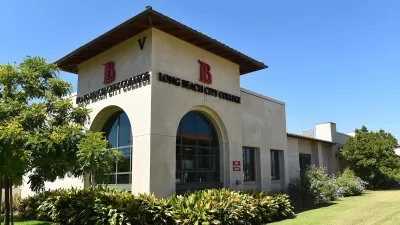This is not our first story on preserving a huge donut sign. What makes this one special is that it's as much about Long Beach as it is about preservation. And what makes it ironic is whom they had to fight to keep the donut from being torn down!
"(T)he giant pink doughnut that marks the former site of a Mrs. Chapman’s Angel Food Donuts chain is a beloved Long Beach landmark," writes Sarah Goodyear. Chapman's went out of business a decade ago, and you'd think the new owner would appreciate the landmark, but America's largest donut maker has shown no such inclination.
The aging doughnut, perhaps structurally compromised, didn't fit into (Dunkin’ Donuts') modern profile. The franchise announced plans to destroy it, along with the adjacent building, when it took over the site.
Thus began the campaign by the Los Angeles Conservancy and others to "Save the Giant Donut".
For many, the fight to save the doughnut was about trying to retain the city’s distinctive character. Long Beach is a busy port city, with an industrial history and one of the most ethnically diverse populations in the nation. For generations, it has been overshadowed by Los Angeles, its glitzier neighbor to the north. But it has been experiencing something of a renaissance lately, with city leaders focusing on improving the city’s quality of life and bringing back downtown neighborhoods – in part by creating some of the region's best bike infrastructure.
Goodyear, a former Streetsblog writer, makes clear that the donut's location is about as far removed from good biking infrastructure as one would expect from any freeway exit location, yet it's indicative of another irony: "Attracting fast-moving drivers is exactly what such signs were designed to do. Now the wheel of history has come full circle - a sign designed to be ultramodern has come to represent a quainter time."
And the good news, writes Goodyear, is that "(i)t appears they've won their battle. In an appearance before the city planning commission last week, a managing partner of the Dunkin’ Donuts franchisee announced that his company had heard the message. "We want to be good neighbors," he said, according to the Los Angeles Times. "The last thing we want to do is be viewed as the guys that killed the doughnut."
If you'd like another good donut story, in 2009 we posted "Donut Architecture" about a donut shop in nearby Los Angeles.
FULL STORY: The Importance of a Giant Doughnut

Planetizen Federal Action Tracker
A weekly monitor of how Trump’s orders and actions are impacting planners and planning in America.

Maui's Vacation Rental Debate Turns Ugly
Verbal attacks, misinformation campaigns and fistfights plague a high-stakes debate to convert thousands of vacation rentals into long-term housing.

Restaurant Patios Were a Pandemic Win — Why Were They so Hard to Keep?
Social distancing requirements and changes in travel patterns prompted cities to pilot new uses for street and sidewalk space. Then it got complicated.

In California Battle of Housing vs. Environment, Housing Just Won
A new state law significantly limits the power of CEQA, an environmental review law that served as a powerful tool for blocking new development.

Boulder Eliminates Parking Minimums Citywide
Officials estimate the cost of building a single underground parking space at up to $100,000.

Orange County, Florida Adopts Largest US “Sprawl Repair” Code
The ‘Orange Code’ seeks to rectify decades of sprawl-inducing, car-oriented development.
Urban Design for Planners 1: Software Tools
This six-course series explores essential urban design concepts using open source software and equips planners with the tools they need to participate fully in the urban design process.
Planning for Universal Design
Learn the tools for implementing Universal Design in planning regulations.
Heyer Gruel & Associates PA
JM Goldson LLC
Custer County Colorado
City of Camden Redevelopment Agency
City of Astoria
Transportation Research & Education Center (TREC) at Portland State University
Jefferson Parish Government
Camden Redevelopment Agency
City of Claremont





























